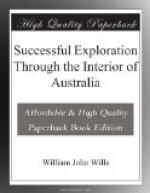“I pray your hospitality for Mr. W. J. Wills, for whom I have a very high esteem and friendship. He makes me happy beyond flattery by permitting me to think that I add something to his life. You cannot fail to like him. He is a thorough Englishman, self-relying and self-contained; a well-bred gentleman without a jot of effeminacy. Plucky as a mastiff, high-blooded as a racer, enterprising but reflective, cool, keen, and as composed as daring. Few men talk less; few by manner and conduct suggest more. One fault you will pardon, a tendency to overrate the writer of this letter.”
This gentleman, Mr. Birnie, is a son of the late Sir Richard Birnie, so long an eminent police magistrate in London. At the close of a lecture which he gave at Ballaarat on the 24th of May, 1862, subsequent to the disastrous intelligence of my son’s death, he introduced the following remarks, as reported in a colonial paper:—
If amusement and gravity might be held compatible, they would bear with him in pronouncing the name of William John Wills. (Cheers.) The lecturer, when first in Melbourne, lived at a boarding-house, and there he met Wills. Their friendship soon grew and strengthened, in spite of the difference of their ages. Of the man as a public explorer, everybody knew as well as he did. Professor Neumayer said that Wills’s passion for astronomy was astonishing, and that his nights were consumed in the study. Yet his days also were spent in enlarging his literary attainments. But with all this labour, Wills never disregarded the commoner duties and virtues of life. Even at the breakfast-table he was as neat and clean as a woman. At the ball, of which he was as fond as a child, he was scrupulously temperate, and in speech pure as a lady. Wills read Sharon Turner, Hazlitt, Pope, Wordsworth, Tennyson, and commented on all. Of Tennyson’s In Memoriam he said it was wonderful for its frequent bordering on faults without ever reaching them. He was a student of literature as well as of astronomy and science. Much intercourse they had had, and when the lecturer heard of his death he felt glad that nothing existed for recrimination or self condemnation. Wills was a great admirer of Shakespeare, and his remarks on that author were original and striking. This tribute the lecturer would lay upon his friend’s bust, and humble though the offering was he felt it would be accepted. The lecturer with much feeling concluded a peroration of eloquent eulogy upon his deceased friend, amid the loud and prolonged applause of the audience, who had cheered him at frequent intervals throughout the whole of his discourse.
Mr. McDowall moved a vote of thanks to the lecturer, seconded by Mr. Dimant, both gentlemen highly complimenting Mr. Birnie for his kindness in giving his services on the occasion.
The vote was carried by acclamation, and Mr. Birnie, in acknowledging it, implored the audience not to let the movement die away. The proposed monument could not be too good for the fame of the heroic explorers, and particularly as commemorating the patient, pious, unselfish manliness of Wills to the latest moment of his life. (Cheers.)




